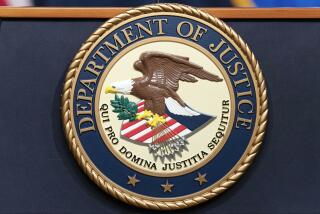Al Qaeda in Lodi âUnlikelyâ
SACRAMENTO â Within weeks after an Oregon convenience store clerk told the FBI he had seen Al Qaedaâs No. 2 leader worshipping at a Lodi, Calif., mosque, agents determined the report was âhighly unlikely,â according to testimony Wednesday in a Northern California terrorism case.
Despite serious doubts about the information from Pakistani immigrant Naseem Khan in a series of interviews shortly after Sept. 11, 2001, the FBI hired Khan as an undercover operative, paying him nearly $230,000 in salary and expenses to secretly infiltrate the Lodi Muslim community from 2001 until 2005.
Khan, a key witness in the terrorism case against a Lodi father and son, shocked a federal courtroom here earlier this month when he testified that he had seen Al Qaeda leader Ayman Zawahiri -- the man believed to be behind the 1998 bombings of U.S. embassies in Kenya and Tanzania -- in Lodi in 1998 and 1999.
Most terrorism experts believe Zawahiri did not travel to the United States after 1995.
Sacramento FBI Agent Rachel Pifer testified Wednesday that a quick check of Khanâs assertion showed that it was probably false.
âI thought the probability that he saw Zawahiri during this period of time was probably pretty slim,â Pifer said. But Pifer also said the agency decided to make him an informant because he appeared sincere, if mistaken. Defense attorneys contend that Khan would never have been hired if he had not made his sensational claim.
The prosecution in the trial of Lodi ice cream truck driver Umer Hayat, 48, and his son Hamid Hayat, 23, rested its case Tuesday with satellite photographs of what the government says is a terrorist training camp in Pakistan that the son attended in late 2003. Hamid Hayat is charged with âproviding material support to terrorismâ by attending the camp. Both men are charged with lying to the FBI.
Hoping to impeach Khanâs key testimony by showing that he lied in his very first meetings with FBI agents, defense attorneys called to the stand Pifer, who was Khanâs handler in 2001-2002, and Eric Barnhart, who initially contacted Khan on Oct. 17, 2001.
âThe problem is that they continued to use an informant they didnât believe,â defense attorney Wazhma Mojaddidi said.
More to Read
Sign up for Essential California
The most important California stories and recommendations in your inbox every morning.
You may occasionally receive promotional content from the Los Angeles Times.









